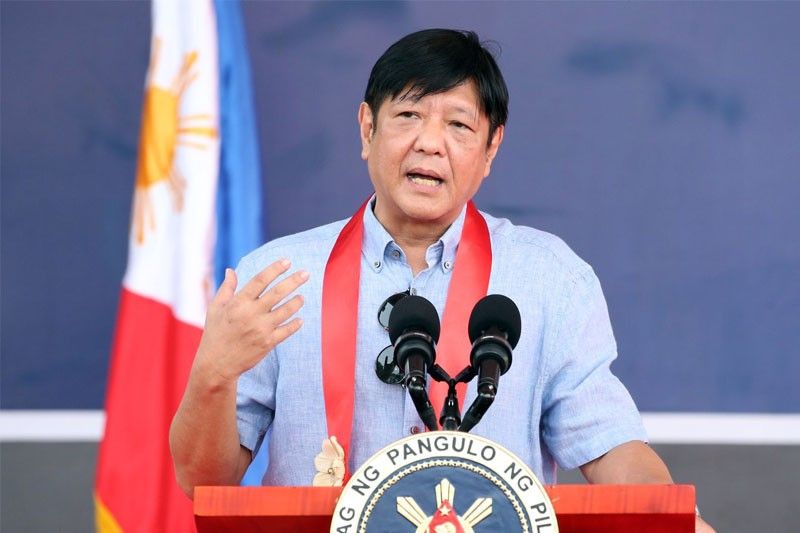President Marcos: My father was not a dictator

MANILA, Philippines — President Marcos is not bothered being called the “son of the dictator” even as he defended his late father and namesake’s imposition of martial law in 1972, saying it was necessary to prevent rising disorder caused by communist and separatist rebellions at the time.
Marcos gave the response during a pre-recorded interview with Toni Gonzaga at Malacañang aired on ALLTV last Tuesday, coinciding with the President’s 65th birthday.
It was Marcos’ first one-on-one interview after his landslide victory in the May 9 elections.
“The ‘son of the late dictator.’ When you hear that, how does that make you feel? Does it affect you?” Gonzaga, niece-in-law of Marcos’ wife Louise, asked the President.
“No, because I know they’re wrong. How many times have I been here in this room where he was in consultation with different groups? A dictator does not consult. A dictator just says, ‘This is what you should do, whether you like it or not,’” Marcos replied partly in Filipino.
“Because I know that everything he did, he did with consultation with whoever. No matter what the system of the government was. That’s why for me, you can say what you want, that’s your opinion. You’re wrong,” he added.
Marcos claimed there was less consultation with ordinary people and groups, including farmers, in most administrations that followed his father’s 20-year term.
“How many times have I watched caucuses here (at Malacañang), have I watched meetings in this hall? That in different industries, he really talked to them. ‘What we should really do? What do you really want?’” the younger Marcos said.
READ: Palace: Law, court rulings acknowledge martial law abuses
He emphasized that his father declared martial law as his government was simultaneously fighting communist and separatist rebellions and not to stay in power.
“Martial law was declared because of the wars, the two wars we were fighting on two fronts. The CPP-NPA was fomenting revolution. They wanted to bring down the government through violent means. The government had to defend itself,” the President said.
“The second front was the secessionist movement down in the South led by MNLF and chairman Nur Misuari at the time. He started that uprising, the secessionist movement,” he said.
The elder Marcos placed the Philippines under military rule on Sept. 21, 1972 through Proclamation 1081.
The younger Marcos recalled his mother, former first lady Imelda Marcos, even flew to Libya, which was supporting the separatist movements in the Philippines then.
“Those were the dangers and the perils that the country was facing. Most people do not realize … the communist rebels, how close they came to Manila and how close they came to large urban centers and slowly gained control,” he said.
On Jan. 17, 1981, Marcos Sr. issued Proclamation 2045 lifting martial law in preparation for the first state visit of St. Pope John Paul II on Feb. 17, 1981.
In the same televised interview, the younger Marcos denied accusations that his family was distorting history, saying “the victors write history.”
“Because the victors write history, don’t they? It is the victors in a conflict that will write the history. The government fell. So the victors wrote this history. And that’s what you were – that’s what is being taught in school and that’s what you heard and learned.”
The non-violent EDSA People Power Revolution in 1986 led to the end of the elder Marcos’ regime.
He died while in exile in Hawaii in September 1989 at the age of 72.
Last March, former Commission on Elections chairman Andy Bautista said the Presidential Commission on Good Government (PCGG) would likely be dissolved if the younger Marcos would be elected president.
The PCGG was created under the term of the late former president Corazon Aquino to go after the Marcos family’s ill-gotten wealth.
Bautista served as PCGG chairman during the administration of Aquino’s son, Benigno Aquino III.
In February 2013, the younger Aquino signed a law providing P10 billion for martial law victims.
READ: Over 1,000 academics vow to protect Martial Law history from revision
‘Historical distortion’
Meanwhile, activist group Bagong Alyansang Makabayan (Bayan) has slammed Marcos over supposed historical distortion by claiming that the declaration of martial law by his late father was necessary to defend the country from communist and Moro insurgents.
“On the 50th anniversary of the declaration of martial law, the dictator’s son Ferdinand Marcos Jr. continues to echo the big lie that martial law was necessary for the government to defend itself from communist and Moro insurgencies. This lie has been discredited by actual historical facts, which the Marcos regime now desperately tries to erase,” Bayan secretary general Renato Reyes said.
The group issued the statement after Marcos’ interview with Gonzaga.
Bayan maintained that Marcos’ father declared martial law to “scrap the elections, extend his term, dissolve Congress and centralize power unto himself, making him a dictator from 1972 to 1986.”
“That is not defending the government. This is making the government your personal fiefdom, where all power emanates from one man. This, in fact, undermined, not defended, government,” Reyes said.
“During his reign of terror, Marcos arrested and jailed not just communists or Moro insurgents, but everyone opposed to his tyrannical regime, including opposition leaders, journalists, academics, students, farmers, workers and ordinary people. This was not defending the government. This was assaulting democracy and the people,” he added.
Based on the data of human rights watchdog Amnesty International, about 70,000 to 72,000 were imprisoned, 34,000 were tortured and 3,240 were summarily killed from 1972 to 1981.
“Marcos used his absolute control over government to amass ill-gotten wealth estimated to run up to $10 billion. That is not defending the government. That is plundering the government and bankrupting the economy,” Reyes said.
As of last year, the PCGG had recovered P174 billion from the Marcoses and their cronies.
Reyes said that despite damning historical records, the younger Marcos has “focused more on image-building than on solving the problems of the country.”
“His latest interview with Toni Gonzaga is again being used to whitewash the crimes of the dictator Marcos Sr. As expected, he will use official platforms to glorify his father and erase the terrible acts of the dictatorship,” Reyes added.
Bayan, together with other groups and martial law victims, will hold a protest rally on Sept. 21, dubbed “SING-kwenta: Mga kanta at kwento ng martial law” to commemorate the 50th anniversary of the 1972 martial law declaration.
“The cultural event aims to uphold the historic lessons of martial law and the dictatorship and celebrate the courageous struggle of our people for genuine freedom and democracy. Veterans of martial law and today’s younger generation are set to come together in an event that affirms our commitment to fight historical denialism,” Reyes said. – Elizabeth Marcelo
- Latest
- Trending































